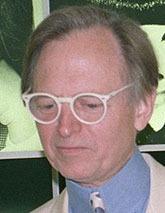Tom Wolfe
Critique • Works • Views and quotes
 TOM WOLFE, 1988 (MoSchl)
TOM WOLFE, 1988 (MoSchl)Born
Richmond, Virginia, United States, 1930
Died
New York City, United States, 2018
Places lived
Richmond, Virginia, United States; Springfield, Massachusetts; Washington, D.C.; New York City
Nationality
American
Publications
Novels, journalism, essays
Genres
Literary, new journalism
Writing language
English
Literature
• Bonfire of the Vanities (1987)
Novels
• Bonfire of the Vanities (1987)
American Literature
• Bonfire of the Vanities (1987)
• A Man in Full (1998)
On books, writers and writing
1972
I doubt if many of the aces I will be extolling in this story went into journalism with the faintest notion of creating a "new" journalism, a "higher" journalism, or even a mildly improved variety. I know they never dreamed that anything they were going to write for newspapers or magazines would wreak such evil havoc in the literary world...causing panic, dethroning the novel as the number one literary genre, starting the first new direction in American literature in half a century.... Nevertheless, that is what has happened. [Saul] Bellow, [John] Barth, [John] Updike—even the best of the lot, Philip Roth—the novelists are all out there ransacking the literary histories and sweating it out, wondering where they now stand. Damn it all, Saul, the Huns have arrived....
Even the obvious relationship between reporting and the major novels—one has only to think of Balzac, [Charles] Dickens, Gogol, Tolstoy, Dostoyevsky, and, in fact, [James] Joyce—is something that literary historians deal with only in a biographical sense. It took the New Journalism to bring this strange matter of reporting into the foreground.
Essay in New York Magazine
1973
[On Truman Capote's nonfiction novel In Cold Blood]
For all his attention to novelistic technique, however, Capote does not use point of view in as sophisticated way as he does in fiction. One seldom feels that he is really inside of the minds of the characters. One gets a curious blend of third-person point of view and omniscient narration. Capote probably had sufficient information to use point of view in a more complex fashion but was not yet ready to let himself go in nonfiction.
The New Journalism, anthology edited by Tom Wolfe
1989
Emerson said that every person has a great autobiography to write, if only he understands what is truly his own unique experience. But he didn't say every person had two great autobiographies to write. Dickens, Dostoyevki, Balzac, Zola, and Sinclair Lewis assumed that the novelist had to go beyond his personal experience and head out into society as a reporter. Zola called it documentation, and his documenting expeditions to the food markets, newspaper offices, barnyards, railroad yards, and engine decks, notebook and pen in hand, became legendary. To write Elmer Gantry, the great portrait of not only a corrupt evangelist but also the entire Protestant clergy at a time when they still set the moral tone of America, Lewis left his home in New England and moved to Kansas City. He organized Bible study groups for clergymen, delivered sermons from the pulpits of preachers on summer vacation, attended tent meetings and Chautauqua lectures and church conferences and classes at the seminars, all the while doggedly taking notes on five by-eight-cards.
It was through this process, documentation, that Lewis happened to scoop the Jim Bakker story by sixty years—and to render it totally plausible, historically and psychologically, in fiction....
At this weak, pale, tabescent moment in the history of American literature, we need a battalion, a brigade, of Zolas to head out into this wild, bizarre, unpredictable, hog-stomping, Baroque country of ours and reclaim it as literary property....
Of one thing I am sure. If fiction writers do not start facing the obvious, the literary history of the second half of the twentieth century will record that journalists not only took over the richness of American life as their domain but also seized the high ground of literature itself.
"Stalking the Billion-Footed Beast", Harper's Magazine
1999
"Let's take [John] Irving. He's our prime subject today. His last, A Widow for One Year, is about some neurotic people in the Hamptons. They never get to town. They're in the house. They're neurotic....
Irving is a great admirer of [Charles] Dickens. But what writer does he see now the last year constantly compared to Dickens? Not John Irving, but Tom Wolfe.... It must gnaw at him terribly....
I think of the three of them now—because there are now three [Irving, John Updike and Norman Mailer], as Larry, Curly and Moe. It must gall them a bit that everyone, even them, is talking about me.
Interview on CBC program Hot Type.

